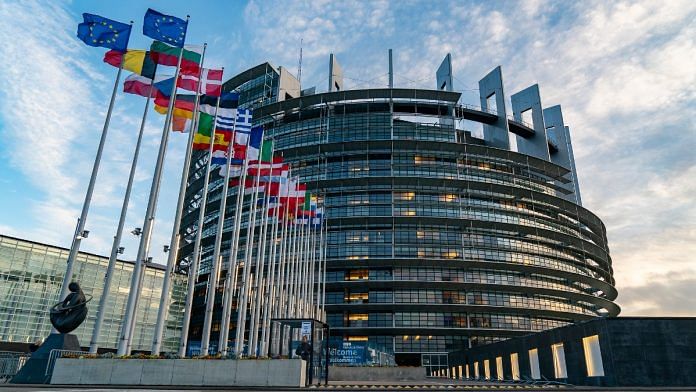New Delhi: A day after Russian state-owned energy giant Gazprom declared that it would drastically slash gas supplies to Germany, European Union (EU) member states Tuesday agreed to voluntarily reduce their gas usage by 15 per cent between August 2022 and March 2023.
Accusing Russia of weaponising energy supplies amid the war in Ukraine, EU said in a statement: “The purpose of the gas demand reduction is to make savings ahead of winter in order to prepare for possible disruptions of gas supplies from Russia that is continuously using energy supplies as a weapon.”
The 15 per cent voluntary cut is in keeping with the EU’s commitment to reduce Russian gas imports by two-thirds by the end of this year.
While this could mean a drastic reduction in Russian gas supplies to Europe, compared to usual, it might not necessarily result in a severe reduction in revenues for Russia.
In 2021, the EU imported 155 billion cubic metres of natural gas from Russia, which accounted for 45 per cent of the 27-nation bloc’s total gas imports and 40 per cent of its gas consumption that year. And though all EU member states have committed to voluntarily reducing gas usage by 15 per cent, some countries have been exempted from the pledge.
Member states “that are not interconnected to other member states’ gas networks are exempted from mandatory gas reductions as they would not be able to free up significant volumes of pipeline gas to the benefit of other member states”.
Moreover, EU nations whose electricity grids are not synchronised with the European electricity system and are “heavily reliant on gas for electricity production” have also been exempted.
Also Read: Latest from Russia disinformation stable: US experiments ‘turning Ukraine troops into monsters’
EU’s dependence on Russia
Data from the European Commission shows that Russia fulfilled 43 per cent of EU’s natural gas needs in 2020. This figure climbed to 45 per cent in 2021, the year EU paid Russia €99 billion, or roughly $101 billion, for gas imports.
Significantly, in the case of EU member states Bosnia and Herzegovina, Moldova, and North Macedonia, Russia accounted for 100 per cent of their gas imports last year.
Further, Russia accounted for 86 per cent of gas imported by Austria, 75 per cent by Finland, 50 per cent by Poland, 49 per cent by Germany, 38 per cent by Italy, and 15 per cent by France in 2021.
Given the scale of Russia’s share in EU’s gas imports, finding either a quick or an easy substitute for Russian supply seems highly unlikely.
To cover any shortfalls in supplies, the EU might have to turn to alternative supplies from Qatar and the US. But given the inadequate pipeline networks connecting these countries to the EU, that may prove to be difficult.
Instead, Liquified Natural Gas (LNG) may have to be shipped in tankers from Qatar and the US to the EU.
However, since “there aren’t enough LNG terminals in Europe, this will be a problem for Germany, particularly,” said Kate Dourian, senior energy advisor to the BBC.
The International Energy Agency (IEA) has suggested measures for the EU to smoothen its decoupling from Russian gas. These include preventing EU member states from signing any new gas import contracts or agreements with Russia. The body has also advised the EU to expedite its transition to green energy by enhancing solar and wind projects as alternatives to gas.
Will Russia’s revenue take a hit?
The Nord Stream-1 pipeline, the biggest pipeline between Russia and Europe, alone accounts for nearly 20 per cent of Russian gas exports to Europe. Given the latest round of supply cuts announced by Gazprom, which owns a majority in Nord Stream-1, the pipeline will be operating far below capacity.
Despite sanctions slapped on Russia by the West over its invasion of Ukraine, soaring gas prices shielded Gazprom from suffering a major drop in revenue this year, compared to last year.
According to estimates, till June 2022, Gazprom was earning nearly €100 million a day in gas exports to Europe, the same as last year.
Alexey Miller, CEO of Gazprom, declared in June that despite the lower volumes of supplies to Europe, revenue was not suffering due to increased prices.
According to reports, in the first 100 days of the war in Ukraine, Russia made $100 billion from fossil fuel exports, including gas.
Essentially, Russia’s loss of gas revenue will depend on the extent to which the EU is able to decouple itself from Russian gas, develop alternatives for the long run, and speed up its transition to green energy.
(Edited by Amrtansh Arora)
Also Read: EU eases some sanctions on Russian assets to tackle global food crisis, open Ukraine port blockade



